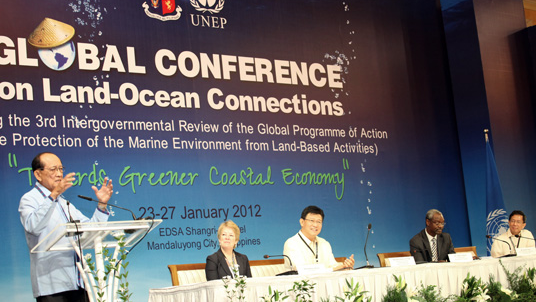The Global Conference on Land-Ocean Connections (GLOC) addressed: managing the global nutrient cycle; marine litter; coastal ecosystems; wastewater; deltas; and “a green economy in a blue world.” Participants agreed to forward a series of recommendations to the Third Intergovernmental Review on the GPA, which met immediately after the GLOC.
 24 January 2012: The Global Conference on Land-Ocean Connections (GLOC) took place immediately prior to the Third Intergovernmental Review (IGR-3) on the Implementation of the Global Programme of Action for the Protection of the Marine Environment from Land-Based Activities (GPA), in order to provide recommendations to the IGR-3.
24 January 2012: The Global Conference on Land-Ocean Connections (GLOC) took place immediately prior to the Third Intergovernmental Review (IGR-3) on the Implementation of the Global Programme of Action for the Protection of the Marine Environment from Land-Based Activities (GPA), in order to provide recommendations to the IGR-3.
Meeting in Manila, the Philippines, from 23-24 January 2012, the GLOC addressed: managing the global nutrient cycle; marine litter; coastal ecosystems; wastewater; deltas; and “a green economy in a blue world – the contribution of marine and coastal ecosystems and management to move towards higher use efficiency, sustainable food, and water security and improved water quality.”
The GLOC recommended IGR-3 consider the following, inter alia, for inclusion in the Programme of Work for the period 2012-2016 and the Manila Declaration: marine litter topics; promoting the use of The Honolulu Strategy to reduce the amount of marine debris from land-based sources; conducting education and outreach on marine debris and solid waste minimization and management; employing market-based instruments to support solid waste minimization and management; employing infrastructure and best practices for storm water and solid waste minimization and management; improving the regulatory framework regarding storm water and sewage systems, among others, in tributary waterways; building capacity to monitor and enforce compliance regarding litter, dumping, solid waste management, storm water and surface runoff; conducting targeted cleanup efforts on coastal lands, in watersheds and in waterways; and establishing a partnership, including interested parties, stakeholders, regional seas conventions and action plans, to engage interested countries and non-government stakeholders to develop and carry out projects addressing land-based and sea-based sources of marine pollution as a regional implementation platform. [IISD RS Meeting Coverage] [IISD RS Story on IGR-3]